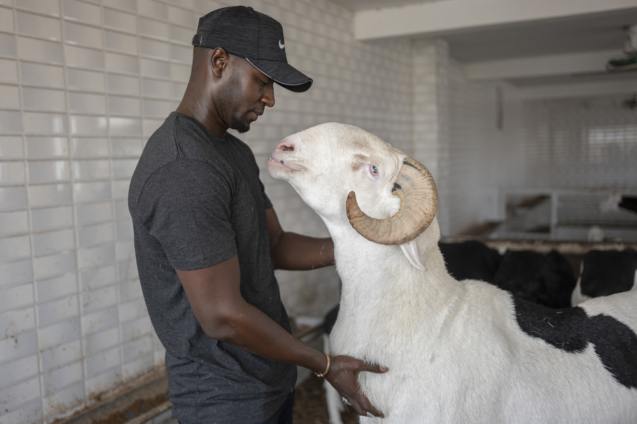When Cheikh Moustapha Seck, a 24-year-old sheep breeder from Senegal, speaks about his animals, his face lights up.
“You need love and patience to work with the sheep,” said Seck, affectionately stroking the long neck of Sonko, his champion sheep, named after the country’s new prime minister.
Sonko is no ordinary sheep. It is a locally bred Ladoum, the equivalent of a Ferrari among the woolly creatures. The majestic-looking Ladoum can weigh up to 397 pounds (180 kilograms), and it has made this coastal West African nation famous among breeders.
As Muslims worldwide prepare to celebrate Eid al-Adha this weekend, the second most important holiday in the Islamic calendar, the Ladoum get their moment to shine.
During Tabaski, as the holiday is locally known, Muslims commemorate the Quranic tale of Ibrahim’s willingness to sacrifice Ismail as an act of obedience to God. They kill and eat a sheep, making the animal extremely sought after in the days before the holiday.
Sonko the sheep was born last year, when its namesake Ousmane Sonko was still an imprisoned opposition leader and seemingly far from leading the country. Just like him, Sonko the sheep “was a warrior and our hope,” Seck said.

As political events have calmed since Senegal’s election earlier this year, this weekend’s celebrations have new life. People have turned their attention from protests to pampering — the prize sheep, at least.
Celebrated for their gleaming white fur and symmetrical horns, the Ladoum is most often bought for prestige breeding and beauty contests, and not to be eaten. On Eid al-Adha, like Ibrahim’s son, they will be spared.
Very few in Senegal can afford a Ladoum. Worth up to $70,000, the sheep is the ultimate symbol of social prestige in a country where the GDP per capita does not exceed $1,600. After years of record inflation, many struggle to afford regular sheep at prices starting from around $280.
The Ladoum spend their days being groomed, massaged and fed syringes of vitamins in special parlors, decorated with photos of champion sheep and their lineage.
Balla Gadiaga, a parlor owner who inherited the passion for sheep from his parents, said his clients come from all over the African continent.
“Just yesterday, I had someone from Abuja on the phone,” he said, referring to Nigeria’s capital. “We sell to clients in Senegal but also in Gambia, Nigeria, Mali. Everywhere.”
His favorite sheep is named BRT after the acronym for electric buses driving around Dakar, the capital. It is of “excellent measurements” and “extraordinary beauty,” he said. It is also worth $40,000, a deal compared to Gadiaga’s most expensive at over $65,000.
Gadiaga said the sheep are not only great business but also a source of happiness.
“When you are stressed out and you go in front of the sheep, you are cool,” he said. “You feel at ease.”
Latest Stories
-
30 suspects arrested as IGP orders raids on galamsey hotspots in 3 regions
17 minutes -
BlowChem announces price reductions on beverages, effective June 1
1 hour -
When lawmakers themselves appear unwilling to abide by the laws they legislate
5 hours -
Mahama promises 200,000-hectare cocoa expansion to revitalise industry
5 hours -
Communications Minister unveils gov’t’s digital inclusion plan for PWDs
5 hours -
Youth group accuses judiciary of undermining anti-corruption efforts
5 hours -
Parliament recommends ratification of WTO agreement on fisheries subsidies
5 hours -
Ghana to roll out Labour Export Initiative – Mahama announces
5 hours -
Two killed in fatal accident on Bole–Damongo Road
6 hours -
Joseph Ade Coker, former NDC Greater Accra Regional Chairman dies
6 hours -
From Bulldozing to Bail-Begging: Wontumi’s Plot Twist No One Saw Coming
6 hours -
Mahama promises new modern regional hospital for Ahafo Region
6 hours -
Appiagyei-Atua: Protest by Minority over Wontumi’s arrest unnecessary and theatrical
6 hours -
Parliament approves GH¢10bn for NHIA
6 hours -
Martin Kpebu alleges some NPP bigwigs exploiting Wontumi’s arrest for political gain
7 hours

